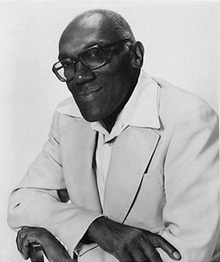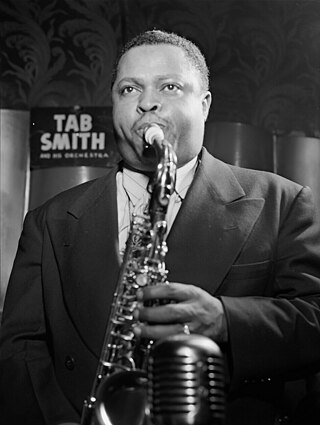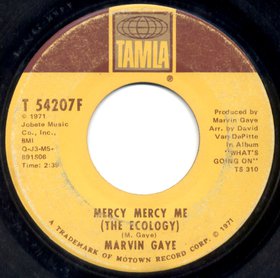Related Research Articles

Wynonie Harris was an American blues shouter best remembered as a singer of upbeat songs, featuring humorous, often ribald lyrics. He had fifteen Top 10 hits between 1946 and 1952. Harris is attributed by many music scholars to be one of the founding fathers of rock and roll. His "Good Rocking Tonight" is mentioned at least as a precursor to rock and roll.

Benjamin Clarence "Bull Moose" Jackson was an American blues and rhythm-and-blues singer and saxophonist, who was most successful in the late 1940s. He is considered a performer of dirty blues because of the suggestive nature of some of his songs, such as "I Want a Bowlegged Woman" and "Big Ten Inch Record".

Lucius Venable "Lucky" Millinder was an American swing and rhythm-and-blues bandleader. Although he could not read or write music, did not play an instrument and rarely sang, his showmanship and musical taste made his bands successful. His group was said to have been the greatest big band to play rhythm and blues, and gave work to a number of musicians who later became influential at the dawn of the rock and roll era. He was inducted into the Alabama Jazz Hall of Fame in 1986.

Talmadge "Tab" Smith was an American swing and rhythm and blues alto saxophonist. He is best remembered for the tracks "Because of You" and "Pretend". He worked with Count Basie, the Mills Rhythm Boys and Lucky Millinder.

"Mercy Mercy Me (The Ecology)" is the second single from American singer-songwriter Marvin Gaye's 1971 album, What's Going On. Following the breakthrough of the title track's success, the song, written solely by Gaye, became regarded as one of popular music's most poignant anthems of sorrow regarding the environment. Led by Gaye playing piano, strings conducted by Paul Riser and David Van De Pitte, multi-tracking vocals from Gaye and the Andantes, multiple background instruments provided by the Funk Brothers and a leading sax solo by Wild Bill Moore, the song rose to number 4 on Billboard's Pop Singles chart and number one for two weeks on the R&B Singles charts on August 14 through to August 27, 1971. The distinctive percussive sound heard on the track was a wood block struck by a rubber mallet, drenched in studio reverb. The song also brought Gaye one of his rare appearances on the Adult Contemporary chart, where it peaked at number 34. In Canada, "Mercy Mercy Me" spent two weeks at number 9.
"Hearts of Stone" is an American R&B song. It was written by Eddie Ray and Rudy Jackson, members of the San Bernardino, California-based rhythm and blues vocal group the Jewels which first recorded it for the R&B label in 1954. The Jewels began as a gospel group, then became the Marbles, recording for the Lucky label out of Los Angeles. According to Johnny Torrence, leader of the Marbles/Jewels, it was taken from a song they recorded in their gospel days.

"Mother-in-Law" is a 1961 song recorded by Ernie K-Doe. It was a number-one hit in the U.S. on both the Billboard Hot 100 chart and the Billboard R&B chart. The song was written and produced by Allen Toussaint, who also played the piano solo. It was issued by Minit Records.
"Tossin' and Turnin'" is a song written by Ritchie Adams and Malou René, and originally recorded by Bobby Lewis in the fall of 1960. The record was released on the Beltone label in December 1960. It reached number one on both the Billboard Hot 100 on July 10, 1961, and R&B chart and has since become a standard on oldies compilations. It was named the number one single on the Billboard chart for 1961, after spending seven consecutive weeks at the top. It was also featured on the soundtrack for the 1978 film Animal House.

"Loving You Is Sweeter Than Ever" is a 1966 song written by Ivy Jo Hunter and Stevie Wonder. It was performed by the Four Tops via the Motown label. In addition to co-writing the song, Wonder also instrumentally contributed drums to the track.

"You Beat Me to the Punch" is a soul single by Motown singer Mary Wells, released on the Motown label in 1962. It was co-written by Smokey Robinson of the Miracles, who was responsible for the majority of hits released by Wells - and another Miracles member, Ronnie White - while Wells was a Motown artist.
Lucky Lips is a song written by Jerry Leiber and Mike Stoller. It was originally recorded by Ruth Brown in 1956 and was successfully covered by Cliff Richard in 1963.
Annisteen Allen was an American blues and jazz singer.
"Doggin' Around" is a 1960 Rhythm and blues song written by Lena Agree and originally performed by Jackie Wilson. Reaching both the R&B and the pop singles charts in the U.S., "Doggin' Around" hit number one on the Hot R&B Sides chart for three weeks and peaked at number fifteen on the Billboard Hot 100. The A-side of the single was "Night", based on the aria "My Heart at Thy Sweet Voice" from the opera Samson and Delilah, by Saint-Saëns; it made the top five on the R&B and pop charts.
"Sweet Slumber" is a 1943 song written by Lucky Millinder, Al J. Neiburg and Henri Woode and recorded by Lucky Millinder and His Orchestra. The song, with vocals by Trevor Bacon, was successful on three charts. "Sweet Slumber" became Lucky Millinder's third number one on the Harlem Hit Parade and number fifteen on the pop charts. The song also peaked at number four on the Most Played Jukebox Hillbilly Records chart.

"I Wonder" is a 1944 song written and originally performed by Pvt. Cecil Gant. The original version was released on the Bronze label, before Gant re-recorded it for the Gilt-Edge label in Los Angeles. The record made it to number one on the Juke Box Race Records chart and was Pvt. Gant's most successful release. In February 1945, pianist, Roosevelt Sykes hit number one with his version of the song. Sykes' version is notable in that it replaced Gant's version, at number one on the Juke Box Race Records chart.
"Who Threw the Whiskey in the Well" is a 1945 song performed by Lucky Millinder and His Orchestra. With Wynonie Harris on vocals, "Who Threw the Whiskey in the Well" became Lucky Millinder's most successful release on both the pop and R&B charts. The song went to number one on the R&B Jukebox chart and number seven on the pop chart. Louis Prima recorded a version soon after.

Henry Bernard Glover was an American songwriter, arranger, record producer and trumpet player. In the music industry of the time, Glover was one of the most successful and influential black executives. He gained eminence in the late 1940s, primarily working for the independent King label. His duties included operating as a producer, arranger, songwriter, engineer, trumpet player, talent scout, A&R man, studio constructor, while later in his career he became the owner of his own label. Glover worked with country, blues, R&B, pop, rock, and jazz musicians, and he helped King Records to become one of the largest independent labels of its time. Thanks to the efforts of family, friends and fans, Glover's hometown of Hot Springs, Arkansas celebrated the 100th anniversary of his birth in 2021 by inducting him into the downtown "Walk of Fame," the Mayor's "Proclamation," "Key to the City," and named a parklet "Henry Glover Way," along Black Broadway after him. In 2018, Glover was recognized with a Lifetime Achievement Award by the King Records 75th Anniversary. In 2013, he was inducted into the Blues Hall of Fame.

"The Hucklebuck" is a jazz and R&B dance tune first popularized by Paul Williams and His Hucklebuckers in 1949. The composition of the tune was credited to Andy Gibson, and lyrics were later added by Roy Alfred. The song became a crossover hit and a dance craze, in many ways foreshadowing the popular success of rock and roll a few years later. It was successfully recorded by many other musicians including Lucky Millinder, Roy Milton, Tommy Dorsey, Frank Sinatra, Lionel Hampton, Louis Armstrong, Chubby Checker, Bo Diddley, Otis Redding, Quincy Jones, Canned Heat, Coast to Coast, Brendan Bowyer and Crystal Swing.

"Little Girl, Don't Cry" is a song written by Lucky Millinder and Doris Davis.
References
- ↑ Scott Yanow. "Lucky Millinder songs". AllMusic . Retrieved March 10, 2017.
- ↑ Whitburn, Joel (2004). Top R&B/Hip-Hop Singles: 1942-2004. Record Research. p. 401.